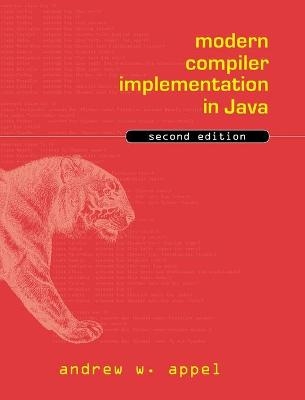
Modern Compiler Implementation in Java
Seiten
2002
|
2nd Revised edition
Cambridge University Press (Verlag)
978-0-521-82060-8 (ISBN)
Cambridge University Press (Verlag)
978-0-521-82060-8 (ISBN)
This textbook describes all phases of a modern compiler, including current techniques in code generation and register allocation, for imperative, functional and object-oriented languages. In a concise and practical way the author describes the fundamentals of compilation and then moves on to advanced topics such as SSA form, loop scheduling, and optimization for cache-memory hierarchies.
This textbook describes all phases of a compiler: lexical analysis, parsing, abstract syntax, semantic actions, intermediate representations, instruction selection via tree matching, dataflow analysis, graph-coloring register allocation, and runtime systems. It includes good coverage of current techniques in code generation and register allocation, as well as the compilation of functional and object-oriented languages, that is missing from most books. The most accepted and successful techniques are described concisely, rather than as an exhaustive catalog of every possible variant, and illustrated with actual Java classes. This second edition has been extensively rewritten to include more discussion of Java and object-oriented programming concepts, such as visitor patterns. A unique feature is the newly redesigned compiler project in Java, for a subset of Java itself. The project includes both front-end and back-end phases, so that students can build a complete working compiler in one semester.
This textbook describes all phases of a compiler: lexical analysis, parsing, abstract syntax, semantic actions, intermediate representations, instruction selection via tree matching, dataflow analysis, graph-coloring register allocation, and runtime systems. It includes good coverage of current techniques in code generation and register allocation, as well as the compilation of functional and object-oriented languages, that is missing from most books. The most accepted and successful techniques are described concisely, rather than as an exhaustive catalog of every possible variant, and illustrated with actual Java classes. This second edition has been extensively rewritten to include more discussion of Java and object-oriented programming concepts, such as visitor patterns. A unique feature is the newly redesigned compiler project in Java, for a subset of Java itself. The project includes both front-end and back-end phases, so that students can build a complete working compiler in one semester.
Part I. Fundamentals of Compilation: 1. Introduction; 2. Lexical analysis; 3. Parsing; 4. Abstract syntax; 5. Semantic analysis; 6. Activation records; 7. Translation to intermediate code; 8. Basic blocks and traces; 9. Instruction selection; 10. Liveness analysis; 11. Register allocation; 12. Putting it all together; Part II. Advanced Topics: 13. Garbage collection; 14. Object-oriented languages; 15. Functional programming languages; 16. Polymorphic types; 17. Dataflow analysis; 18. Loop optimizations; 19. Static single-assignment form; 20. Pipelining and scheduling; 21. The memory hierarchy; Appendix: Mini-Java reference manual.
| Erscheint lt. Verlag | 21.10.2002 |
|---|---|
| Co-Autor | Jens Palsberg |
| Zusatzinfo | Worked examples or Exercises; 35 Tables, unspecified; 80 Line drawings, unspecified |
| Verlagsort | Cambridge |
| Sprache | englisch |
| Maße | 208 x 257 mm |
| Gewicht | 1051 g |
| Themenwelt | Informatik ► Programmiersprachen / -werkzeuge ► Java |
| Informatik ► Theorie / Studium ► Compilerbau | |
| Mathematik / Informatik ► Informatik ► Web / Internet | |
| ISBN-10 | 0-521-82060-X / 052182060X |
| ISBN-13 | 978-0-521-82060-8 / 9780521820608 |
| Zustand | Neuware |
| Haben Sie eine Frage zum Produkt? |
Mehr entdecken
aus dem Bereich
aus dem Bereich
Buch | Hardcover (2012)
Westermann Schulbuchverlag
CHF 44,90
Schulbuch Klassen 7/8 (G9)
Buch | Hardcover (2015)
Klett (Verlag)
CHF 29,90
Buch | Softcover (2004)
Cornelsen Verlag
CHF 23,90


